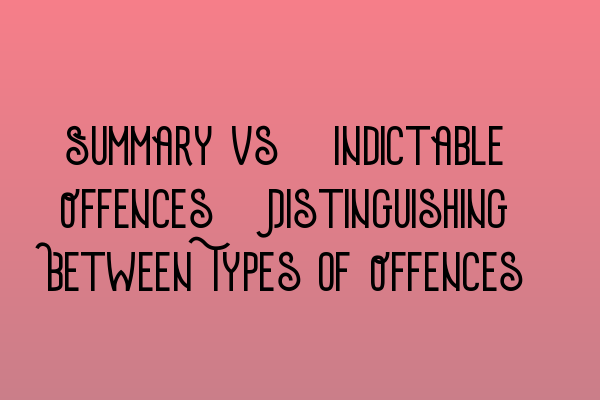Summary vs. Indictable Offences: Distinguishing Between Types of Offences
When it comes to criminal law in the UK, it’s important to understand the distinction between summary and indictable offences. These two categories represent the different types of crimes and carry varying levels of seriousness. In this article, we will explore the differences between summary and indictable offences and provide a comprehensive overview of each.
Summary Offences
A summary offence, also known as a “minor offence,” is a less serious violation of the law that is typically heard and decided by a magistrate in a magistrates’ court. These offences are usually considered less severe and carry lesser penalties compared to indictable offences. Examples of summary offences include petty theft, disorderly conduct, and traffic violations.
Summary offences are generally dealt with through a summary trial, which is a relatively quick and straightforward process. The aim of a summary trial is to swiftly resolve less serious offences without the need for a full-scale trial. The accused individual does not have the right to a jury in a summary trial.
If convicted of a summary offence, the maximum penalty is usually a fine or a short-term prison sentence. The severity of the penalty will depend on the nature of the offence and any previous criminal history of the accused.
Indictable Offences
Indictable offences, also known as “serious offences,” are more significant violations of the law that are generally tried in a Crown Court before a judge and jury. These offences carry stricter penalties and often involve complex legal procedures. Examples of indictable offences include murder, rape, robbery, and drug trafficking.
Unlike summary offences, indictable offences require a more formal and extensive trial process. This includes the presentation of evidence, examination and cross-examination of witnesses, and the right to a trial by jury. The Crown Prosecution Service (CPS) is responsible for prosecuting indictable offences on behalf of the government.
If convicted of an indictable offence, the penalties can be severe and may include long-term imprisonment, heavy fines, or even life sentences, depending on the nature and gravity of the crime.
Differences Between Summary and Indictable Offences
It’s important to note that not all criminal offences neatly fit into either category. Some offences may fall into a hybrid category, where they can be tried either summarily or on indictment, depending on specific circumstances.
So, what are the main differences between summary and indictable offences?
- Trial Process: Summary offences are generally dealt with through a summary trial, whereas indictable offences require a more formal trial process in a Crown Court.
- Severity of Offence: Summary offences are less serious in nature and carry lesser penalties, while indictable offences are considered more grave and carry stricter penalties.
- Jury Right: Accused individuals have the right to a jury trial for indictable offences but not for summary offences.
- Criminal Record: Convictions for both summary and indictable offences will result in a criminal record, which can have long-term consequences for the individual.
If you are facing criminal charges or need legal advice regarding a criminal matter, it’s essential to consult with a qualified criminal solicitor who can guide you through the complexities of the legal system. At SQE Criminal Law & Practice Law UK, our team of experienced solicitors is dedicated to providing expert representation and support for a wide range of criminal law issues.
To learn more about other legal topics related to criminal law and practice, check out these articles:
- LLC Formation Made Simple: Step-by-Step Guide for UK Entrepreneurs
- Business Regulations in the UK: A Comprehensive Overview
- Preparing for the SQE Exam: Strategies and Resources for Success
- SQE Workshops and Webinars: Accelerate Your Exam Preparation
If you have any questions or require legal assistance, please contact us at SQE Criminal Law & Practice Law UK. Our team is ready to provide the expert guidance and support you need.
